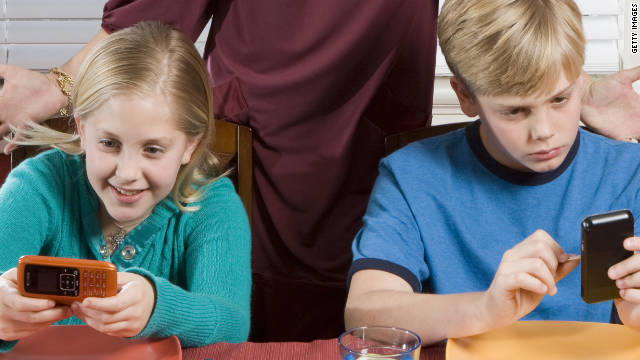Why parents should educate their kids about tech
By Scott Steinberg, Special to CNN
updated 10:11 AM EDT, Wed March 21, 2012 | Filed under: Web
|

- 70% of parents believe schools should do more to educate children about online safety
- Of the nearly eight in 10 teens active on social media, 88% have witnessed acts of bullying
- Online tutorials and interactive activities could provide added discussion points for families
Editor's note: Scott Steinberg is the author of "The Modern Parent's Guide" book series and host of video show "Family Tech: Technology for Parents and Kids." An industry consultant andbusiness keynote speaker, he frequently appears as an on-air technology expert for ABC, CBS, NBC, Fox and CNN.
(CNN) -- How young is too young for a child to have a cell phone?
With the average preschooler now more able to play video games than ride a bike or tie a shoe, and with three-quarters of all middle school- and high school-age kids already owning a phone, it's an increasingly difficult question for today's digital parent to answer.
And it might not even be the most meaningful one.
From growing issues like cyberbullying, cyberbaiting and sexting to rising concerns over Internet safety, cybercrime, and the over-sharing of personal information online, today's family clearly faces a uniquely 21st-century set of digital challenges.
For families in today's rampantly digital world, perhaps the better question is: What are we doing to prepare kids for life in an age of 24/7 connectivity? With 70% of parents believing that schools should do more to educate children about online safety and four-fifths of teachers agreeing that more in-school programs of its type are needed, the answer may be "not nearly enough."
 Dad makes app to shut down teens' phones
Dad makes app to shut down teens' phones Want access to your kids' text messages?
Want access to your kids' text messages?"For parents trying to raise kids and give them the technology to be successful, yet also protect them, there's a sense that no one's there to tell folks what steps to take," said Marian Merritt, Internet safety advocate atSymantec. "I hope schools are distributing information and educating (families), but ultimately, parents have a huge role to play (in the process)."
Today's kids are being trained to use every gadget imaginable but not to consider those devices' extraordinary impact -- good and bad -- on our lives. Given the speed at which technology moves and how slow parents have been to react, a lot of them must play catchup.
"The biggest threat on the Internet today is parents that are not involved in their children's use of technology," explained Judi Warren, president of Web Wise Kids. "It takes a unified effort to keep kids safe on the Internet (that) has to begin with parents, because it has to start really young."
But laying the responsibility for teaching digital citizenship solely at families' feet would be a mistake, Warren said. "It also has to be a part of ongoing education," she added, noting that kids as young as 2 now commonly use smartphones and other technological devices.
Navigating social networks
Capable of enlightening nations and empowering individuals, the Web can be an energizing force for good. But with this power comes responsibility.
Consider the meteoric rise of social networks and how they shape our children's experiences. Only six years ago, before Facebookopened to the general public in September 2006, the term "friend" typically described neighborhood pals and schoolmates.
Today, it can just as easily reference hundreds of peers, potential crushes or even random strangers. Our kids interact online with these people, some of whom we will never meet.
Of the teens active on these sites, 88% have witnessed acts of meanness or cruelty.
Of course, social networks can also be a perfectly safe and fun way for teens to share ideas and form healthy relationships. It's all in how they're used.
"Lightning can be very dangerous too ... and you should educate your kids about it," Merritt said. "But it doesn't mean that they're going to be struck by it."
But when it comes to technology's evolving platforms and ethical codes, parents don't always know best. Adults struggle to keep up with the shifting rules of online etiquette and information sharing. And according to a recent study in the online journal First Monday, some parents are actively lying to help underage kids join Facebook and other networks, unwittingly exposing them to online bullying.
Training programs
Alas, no nationally recognized standard or training system exists to teach kids how to navigate the Web. A formalized online-safety course structure and digital-citizenship certification program could be the answer.
Under such a scenario, starting at the pre-K level, experts would provide hands-on in-school instruction using tablets, touchscreen PCs and Web browsers. Take-home worksheets, online tutorials and interactive activities (delivered via app, downloadable guide or website) could provide added teaching and discussion points for families.
For parents who want to keep current on Web tools and practices, universities or employers could offer continuing-education classes.
Online forums could connect parents and kids to technology and health-care professionals. And experts could build a database of answers to common tech-safety questions for parents.
That would only be the beginning, however. One logical next step would be creating a network of local chapters capable of providing support for families facing issues like cyberbullying and Web addiction.
The big question is no longer whether these guides will be introduced. Experts say it's simply when.
Parents are the key
Stephen Balkam, chief executive officer of the Family Online Safety Institute, encourages creating a holistic "culture of responsibility" when it comes to educating children about Internet safety. Under such a scenario, multiple aspects of society all contribute to keeping kids safe.
Such a program starts at the top, with the government creating laws and providing a safe framework for families. It also includes members of law enforcement doing their part to monitor and catch online predators, Balkam said.
But while educators can stay abreast of Web trends and help guide kids to safety, they can't do it alone. It's ultimately up to parents and their children to maintain running conversations, establish house rules and make wise choices on the Web.
With technology entrenched in our lives, we can no longer afford to simply ignore this. The Internet's potential to improve our kids' lives is boundless. But leaving children, and their parents, unprepared to navigate its pitfalls just doesn't compute.
The views expressed in this commentary are solely those of Scott Steinberg.
Views: 27
Tags:
Welcome to
THE VISUAL TEACHING NETWORK
About
© 2025 Created by Timothy Gangwer.
Powered by
![]()
You need to be a member of THE VISUAL TEACHING NETWORK to add comments!
Join THE VISUAL TEACHING NETWORK